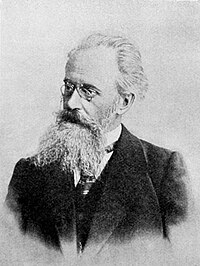N. K. Mikhailovsky
| Nikolay Mikhaylovsky | |
|---|---|
 |
|
| Born |
Nikolay Konstantinovich Mikhaylovsky 27 November 1842 Meshchovsk, Russian Empire |
| Died | 10 February 1904 (aged 61) Saint Petersburg, Russian Empire |
| Occupation | Literary critic, sociologist, writer |
Nikolay Konstantinovich Mikhaylovsky (Russian: Никола́й Константи́нович Михайло́вский) (27 November [O.S. 15 November] 1842, Meshchovsk–10 February [O.S. 28 January] 1904, Saint Petersburg) was a Russian literary critic, sociologist, writer on public affairs, and one of the theoreticians of the Narodniki movement.
The school of thinkers he belonged to become famous in Russia in the 1870s and 1880s as exponents of political and economic reforms. He was a contributor to Otechestvennye Zapiski (from 1869 until it was suppressed in 1884. He became coeditor of Severny Vestnik in 1873, and from 1890 until his death in 1904 he was coeditor of Russkoye Bogatstvo ("Russian Treasure") with Vladimir Korolenko. His collected writings were published in 1913.
In his works, Mikhaylovsky developed the idea of the relationship between the hero and the masses (crowd). Contrary to the ideas popular among revolutionary-minded people of the late 19th-early 20th centuries that an individual having strong character or talent is able to fulfil incredible things and even change of the course of history, in the articles "Heroes and Crowd" (1882) and others, Mikhaylovsky presents a new theory and shows that an individual does not necessarily mean an outstanding individual, but any individual who by chance finds himself within certain circumstances in the lead or just ahead of the crowd. Mikhaylovsky emphasizes that at definite moments an individual can give substantial strength to a crowd (through his emotional and actions), and so the whole event can acquire a special power. Thus, the role of an individual depends on its psychological influence is reinforced by mass perception.
Mikhaylovsky was one of the radical thinkers who were 'acutely conscious of their wealth and privilege', as the psychological inspiration of the revolution was guilt, writing: 'We have come to realise that our awareness of the universal truth could only have been reached at the cost of the age-old suffering of the people. We are the people's debtors and this debt weighs down on our conscience.'
...
Wikipedia
